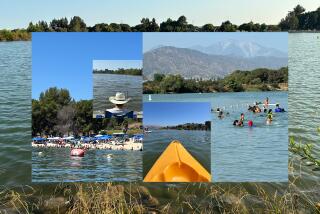PRIVATE LIVES, PUBLIC PLACES : A Park That Preserves Gentle Days
- Share via
Every morning, a rickety camper turns off La Cienega Boulevard into Baldwin Hills and putters up to a lake set into a hillside covered in eucalyptus, sycamores, pine trees and white alder. Across the hill, nodding oil pumps keep up their ghostly rhythm and a Chevron plant smolders and snorts. But here, in Kenneth Hahn Park, there is only the sound of robins, starlings and blackbirds calling, of ducks splashing into the water, of a stream rushing headlong over rocks into the lake. And Henry Crosby, a large, gnarled and solid man, is going fishing as usual.
The park is full of flowers these days: pyracanthus bushes aflame, fields of clover and daisies, banks of orange and purple. Fat and glossy birds bathe in the stream, catfish hide in the dark reeds. In the distance, men grapple clumsily with garden hoes and hedge trimmers; newcomers, on referral from the courts, doing time here instead of in jail, drawn in by the calm clock of the earth.
It is a park for men who came from somewhere else--from dark, crowded rooms in city streets below, but also from other worlds where the soil was all that nourished a man. John Lindsay, the superintendent, learned in Mississippi how to grow corn, cotton, sweet potatoes, peanuts and melon. Worrying over trees in need of iron, sod to lay, bushes to plant, Bermuda grass to feed; this is how he keeps faith with the father who sent him to college in hard times.
His helpers sign in, painfully and slowly; writing does not always come easily. But in the early morning, the restrooms are scrubbed and sparkling, not a speck lingers around the garbage cans. This place of still beauty created from scrub and waste is a gift to be carefully tended. Police circle like stealthy lions watching over a pride. This is a park of gentle days.
Its heart is the lake. Men on upturned 44-pound detergent pails, men on old deck chairs, perched on rocks, standing easily, watching poles and the ripples of wind on the water. Men gone fishing. A community of men under kind and weathered hats; familiar as they are with the tiny signs of fish, they read in each other the smallest signals of friendship. They listen to the wind, laugh aloud--huge hoops of laughter--as one of their number lands a plastic bag, and chuck beneath the chin the small grandchildren and daughters of their cousins’ cousins. Some sit close, chomping, chewing, chatting, poking for worms in battered old fishing boxes. Watercolors from the old South; pictures from long ago.
And, as the sun warms the hillside, Henry Crosby dozes in his sagging chair, knowing that, should a stranger approach, his geese will hiss, warn and threaten the unexpected outsider. Henry’s geese come waddling off the lake as soon as they see his camper turn into the parking lot. They are the companions of his day, never more than yards away. When the catfish skulk, he stands in the clear air, stroking the great, soft breasts of his geese who crane their long necks in delight. Someone stole one of Henry’s geese a while back. The other goose pined, and Henry thought his heart would break. The lake’s fishermen worried with him. One night, weeks later, the goose was put back: joy abounded.
Three times a month--not nearly often enough, grumble the regulars--trucks rumble in from the fishery to feed 320 pounds of catfish into the lake. Next morning, there is hardly place for a man to stand. How does word get around? “I’ll tell you, you tell me, I’ll tell him,” says Henry. The camaraderie of the lake.
Most fish for their dinner. “I don’t like fish much. I don’t eat them much,” says Henry. “I just like to catch them. I just like to be watching the pole and pulling on something.” He is here before 8, leaves when he gets hungry. He fishes in the heat and fishes in the rain. At 77, he cannot remember a time when he didn’t fish.
He was born in South Carolina, son of a cement man. He went to work as a boy and ran away at 9. “It was about 30 years before I let them know where I was. I’m pretty sure they worried. They needn’t of.” Fishing and cement: They have been his life. In his pocket, this gruff and warm man carries a card marking 40 years membership in the plasterers’ and cement masons’ union. He is retired now, his hearing shot. Now he knows only the peaceful life of the lake, the fierce fight of the catfish. “I’ve caught a 12-pounder and seen some bigger than that.” Bigger than that--the cry of fishing men, watching water, as men have since time immemorial.
“This is where you find the nice people,” says Henry. “Down at the water. People who fish are friendly, and if you don’t fish--why, you miss a whole lot of relaxing.”
There are many ways to tell the story of this city; this is one of the nicer ways.
More to Read
Sign up for The Wild
We’ll help you find the best places to hike, bike and run, as well as the perfect silent spots for meditation and yoga.
You may occasionally receive promotional content from the Los Angeles Times.






